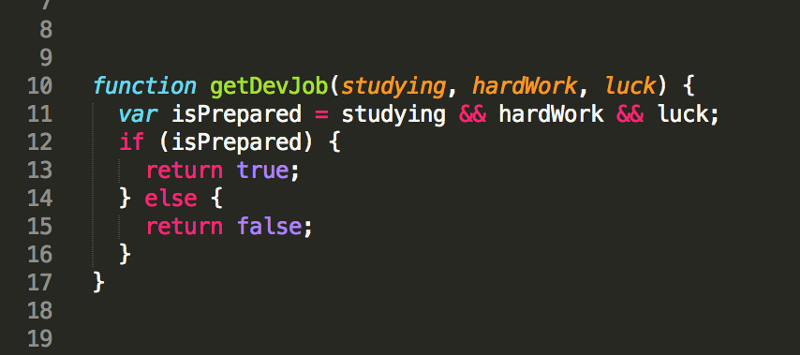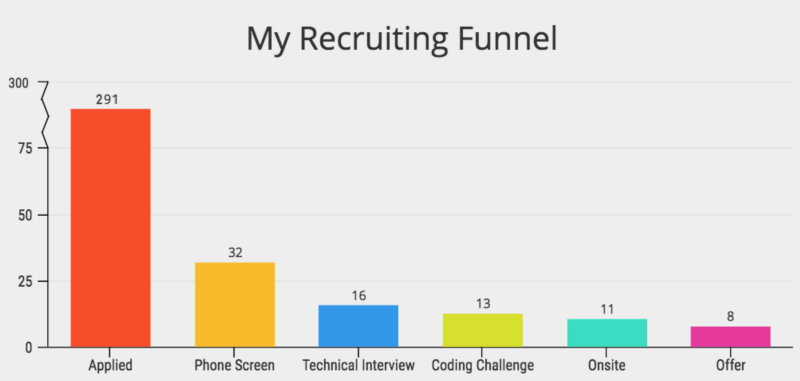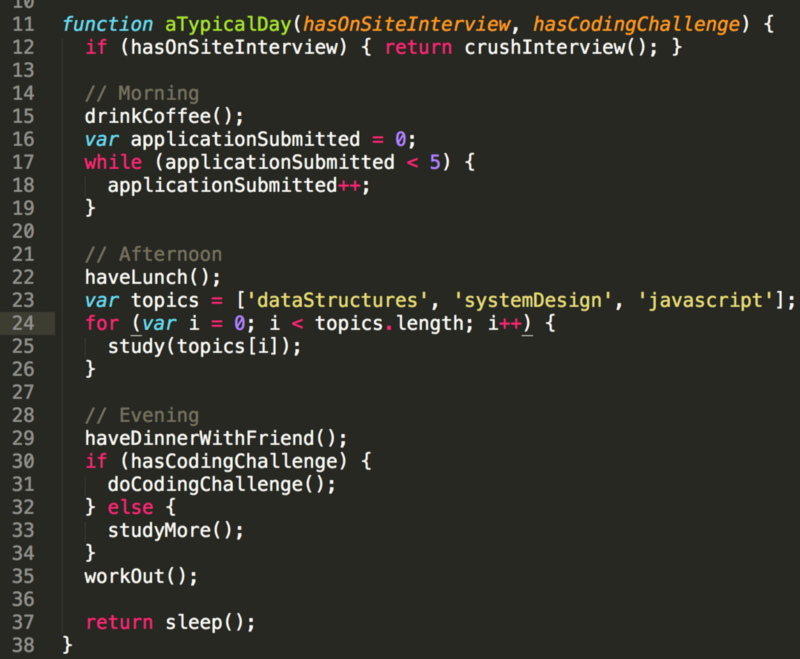I spent 3 months trying to get a job after a programming camp, and this is what I learned

The last thing they say about what will happen after you graduate from the programming camp is when you try to take the position of a developer with a six-figure salary.

<3% of applications became sentences
')
I graduated from Hack Reactor in July 2016, and it took me almost 3 months before I accepted the offer from Radius Intelligence. I applied to 291 companies, completed 32 telephone interviews and 16 regular ones, and also completed 13 programming tasks, 11 of them in offices. And I got a total of 8 sentences. I was offered 60-125 thousand dollars in US companies. In general, 2.8% of applications turned out to be good deals for me.
Here are 5 things I wanted to know before I got a job.
Illumination # 1: try to connect with real people
At first, I applied to the company in the easiest way possible through Indeed.com, AngelList, LinkedIn, StackOverflow, Hacker News, company websites and even Craigslist.
I would like to submit a resume to any specialty that required experience using React, Node or JavaScript. In the first week, I turned to 15-20 organizations per day.
Professional advice : Find companies that use this easy application form.
The result was not comforting. Less than 5% of companies answered me. I seemed to be throwing statements about getting a job in a black hole.
Everything changed when one of my comrades, a former recruiter, shared with me information about how to look for work. He said sending letters directly to people from these companies. It could be anyone. The main thing is that they read your application.
Then, every time I wanted to apply, I looked up the company on LinkedIn and wrote to someone from their technical support or hiring team.
Most small companies or senior executives have an email address in this format, firstName@dreamCompany.com. For large companies, this is firstName.lastName@dreamCompany.com.
To check email, I used Rapportive to link mail to social media accounts.
The results were amazing. After 150+ sent letters, the result improved by 22%.
I also liked to get involved with real people. Surprisingly, even the CEO and CTO answered me. Sometimes they even conducted interviews themselves.
Conclusion: if you get a job in the easiest way, try to reach out to real people.
Illumination # 2: Start small and fight your way up
You will encounter Level 1 interviews (a non-technical company that needs any developer), where you will be asked only trivial questions about JavaScript.
You will encounter level 9 interviews (Google / Facebook level), where you will be asked difficult questions about the data structure and questions about algorithms.
I strategically structure the process so that I first have low-level interviews and then more complex ones.
From companies with low-level interviews, I received experience, confidence in myself and my abilities, and reliable offers.
The more experience I gained, the more effectively I was raised to a new level and could be interviewed in companies where there was a higher bar for employees. This is illustrated below as a linear correlation between the number of weeks I spent on interviews and the salary I was offered.

Direct relationship between the time I spent on interviews and the proposed salary
I have overcome difficult issues. Then he made his way to a high salary. And in the end got the desired position.
Conclusion: Plan your interviews so that you first get easier and then more complex.
Insight # 3: Learn as if your future work depends on it (because it is)
I hate to say it, but the most important thing you have to do is learn and prepare.
Why? Because you will not receive offers if you do not have good answers to the questions that you will be asked.
People will not consider your candidacy if they see that you are not ready for an interview.
Returning to the topic of Hack Reactor, my weakness was data structures and algorithms. The Triplbyte study found that the grades for graduates from the computer camp were weaker than those for computer science graduates.
Therefore, I studied and practiced. Everyday.
I spent whole days studying sorting algorithms. On other days, I focused on understanding how the Internet works.
If I didn’t fully understand the concept, then I spent the whole day watching a video on YouTube or looking for information on StackOverflow until I finally understood.
I found the following study materials helpful:
- InterviewCake: My favorite source of information on data structures and algorithms. It breaks the decision into a step-by-step algorithm — a great alternative to Cracking the Code Interview (CTCI). The only pity is that they do not solve other problems!
- HiredInTech's System Design Section : A great interview guide for a design system.
- Coderust : if you avoid CTCI like the plague, Coderust 2.0 may be perfect for you. For $ 49, you get solutions in almost any programming language using interactive schemes.
- Reddit's How to Prepare for Tech Interviews : I constantly use it as a guide for my training.
- Front End Interview Questions : A comprehensive list of interface questions.
- Leetcode : a resource with questions on algorithms and data structure. You can filter them by company. For example, you can get all the questions that are usually asked by Uber or Google.
Conclusion: too much preparation does not happen.
Illumination # 4: Show your best
To break into the industry is difficult. You have to prove yourself well, even if you are not very prepared. To succeed, you need to be your own lawyer.
Sell yourself
In Hack Reactor, we trained to mask our lack of experience. In our personal life, we deliberately keep silent about our education in the camp of programmers.
Why? Otherwise, we are automatically classified as junior developers or as employees who do not have enough experience.
In one of the interviews with the startup, the interview immediately came to naught, as soon as they heard that I was in the camp of programmers. One company used it against me and offered me $ 60,000 (as much is offered to junior developers).
Ultimately, you must convince the company that you can do this work.
At the same time, you must convince yourself that you can do this work.
You can. Focus on the love of programming. Focus on what you built with React and Node. Focus on demonstrating your extensive knowledge of JavaScript and other programming languages.
Only they can prove that you deserve this job.
This is a two-way conversation.
An interview is a mutual study of the correspondence between the employee and the employer. Although you must convince the employer to hire you, he must also win you.
Do not be ashamed to use the interview as an opportunity to assess the possibility of employment.
I talked to any company, even if I had not the slightest interest in it.
I was interviewed in the field with all the companies that invited me. I asked questions and received knowledge from a team of engineers about the tools and technologies used, the company's problems and the system architecture.
Professional advice : during the interviews ask the following questions:
- What technical difficulties have you recently encountered?
- What do you like about working for company X?
- How are the teams built and how are tasks normally distributed?
I treated each interaction as an opportunity to learn something new. Each interaction helped me improve my report, interview and technical skills. Every failure helped me find my weak points.
Conclusion: know your own worth! And remember, this is mutual intelligence.
Illumination # 5: It's a marathon, not a sprint
The journey is not easy. For 3 months, I honed my skills 6 days a week. But I tried to take care of myself.

This might look like a typical day in javascript.
Some days I studied with friends. On other days, I went to a cafe and studied alone or hung out in the graduation hall of the Hack Reactor. And every week I contacted an employment consultant to talk about my progress.
It is easy to burn out in the process. Eat well, sleep and exercise.
May become lonely. Spend time with friends who go through the same thing as you.
Conclusion: get ready for a long game and make sure you take good care of yourself.
Total:
- Connect with real people
- Start small and make your way up
- Learn that your future work depends on it.
- Show your best
- This is a marathon, not a sprint
The process may seem endless, but you can handle it. Keep counting hours. Keep applying. Keep taking care of yourself. All this will pay off in the end.
Special thanks to Dylan Tran, Karen Cao, Rohit 'Sunny' Rehi, Jake Pace, Anamite Guha, Stephanie Liu, and many others.
Publication support is Edison , which is developing an SDK for tracking geographic objects and a system of online accounting for the Furniture for Home store chain .
Source: https://habr.com/ru/post/316776/
All Articles